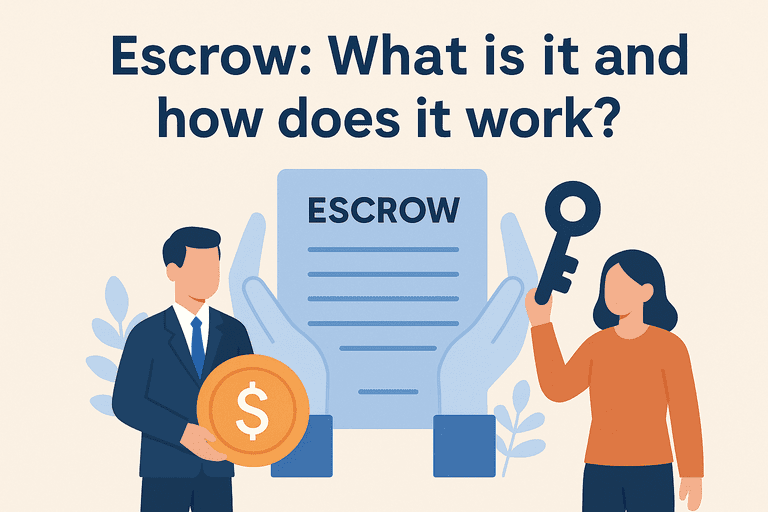Understanding escrow—what it is and how it works—is essential for anyone buying a home or participating in a major financial transaction. Escrow plays a critical role in protecting both buyers and sellers, ensuring that funds and assets are only transferred when all the agreed-upon conditions are met. In this guide, we’ll explain what escrow is, how escrow works in real estate, and why this process is so important.
What Is Escrow?
Escrow is a financial arrangement where a neutral third party, known as an escrow agent, holds funds, documents, or assets on behalf of two parties involved in a transaction until all contractual obligations are fulfilled. The escrow agent only releases the assets or funds when both the buyer and the seller have met the terms of their agreement.
Although escrow is most commonly associated with real estate, it is also used in other transactions, such as mergers and acquisitions, online purchases, and intellectual property deals.
How Does Escrow Work?
The Escrow Process Step-by-Step
Agreement Reached: Buyer and seller agree on the terms of the transaction, such as a home purchase.
Opening Escrow: An escrow account is opened with a neutral third party (escrow agent or company), which will hold the buyer’s earnest money deposit and any necessary documents.
Deposit and Documentation: The buyer deposits earnest money (good faith deposit) into the escrow account. The escrow agent collects all required documents, such as the purchase agreement, title documents, and loan paperwork.
Fulfillment of Conditions: Both parties work to fulfill all contractual conditions—this may include home inspections, appraisals, repairs, or securing financing.
Review and Approval: The escrow agent ensures all conditions are met. If any issues arise, funds or documents may be held until they are resolved.
Closing: Once all terms are satisfied, the escrow agent releases the funds to the seller and the property title to the buyer. The transaction is complete, and escrow is closed.
Types of Escrow Accounts in Real Estate
Escrow is used at different stages of the home buying and ownership process:
1. Home Purchase Escrow
Holds the buyer’s earnest money until the sale closes.
Protects both parties: If the deal falls through due to the buyer’s fault, the seller may keep the deposit; if the seller defaults, the buyer may get the deposit back.
2. Mortgage Escrow Account
After buying a home, the lender may set up an escrow account to collect a portion of your monthly mortgage payment for property taxes, homeowners insurance, and (if applicable) mortgage insurance.
The lender pays these bills on your behalf when due, ensuring they are paid on time.
3. Escrow Holdback
Sometimes, funds are held in escrow after closing to cover unresolved items, such as repairs or outstanding bills. Once the issue is resolved, the funds are released to the appropriate party.
Why Is Escrow Important?
Escrow adds a layer of security and trust to transactions by:
Protecting both parties: Ensures neither the buyer nor the seller can access funds or property until all terms are met.
Reducing risk of fraud: A neutral third party manages the process, minimizing the chance of one party defaulting.
Managing complex transactions: Escrow agents handle all documents and payments, making the process smoother and less stressful for everyone involved.
Escrow in Other Transactions
While escrow is most common in real estate, it is also used for:
Online sales of expensive items (art, jewelry, cars)
Business mergers and acquisitions
Intellectual property transfers
Banking and legal settlements
Frequently Asked Questions: Escrow—What Is It and How Does It Work?
Q: Who chooses the escrow company or agent? A: In real estate, the buyer or seller may choose, depending on local laws and customs.
Q: Do I have to use escrow when buying a home? A: Escrow is mandatory in most home sales to protect both parties, but requirements vary by state and lender.
Q: What happens if the deal falls through? A: The escrow agent distributes the earnest money per the contract terms—often to the seller if the buyer defaults, or back to the buyer if the seller defaults.
Q: Are there fees for escrow services? A: Yes, escrow companies charge fees for their services, usually split between buyer and seller or negotiated as part of the sale.
Conclusion
Escrow is a vital process in real estate and other major financial transactions. By using a neutral third party to hold funds and documents until all conditions are met, escrow protects both buyers and sellers, reduces risk, and ensures a smooth, transparent transaction. Understanding how escrow works will help you navigate the home buying process or any significant purchase with greater confidence.
